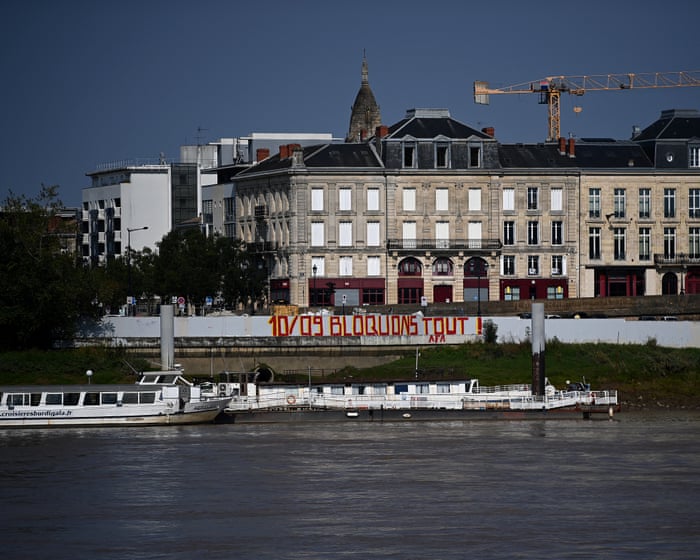François Bayrou may have believed it was a strategic move to call a parliamentary vote of confidence in his minority government before a major national protest on September 10 and the start of a difficult budget season. Rather than risk the same fate as his predecessor, who was ousted by parliament last December, the French prime minister seems to have chosen a form of political self-destruction. His likely defeat by a divided parliament on September 8 is expected to turn a simmering political deadlock into a full-blown crisis of governance.
France’s Fifth Republic constitution, designed by Charles de Gaulle in 1958 to ensure a strong executive and a cooperative legislature, is no longer producing stable governments. Without systemic change, the country faces prolonged political gridlock. In the meantime, it appears unable to resolve a persistent fiscal crisis that is beginning to alarm financial markets. Last week, Finance Minister Éric Lombard did not rule out the possibility of seeking an IMF bailout, though he backtracked quickly when investors grew anxious.
If, as expected, the veteran centrist prime minister is forced out, President Emmanuel Macron has no straightforward way to stabilize the government, pass a budget to reduce the large deficit, or protect his liberal legacy of supply-side economics and pension reforms.
Macron could appoint a new prime minister—his fourth in two years—but there is little indication that France’s political parties are willing to compromise on a viable budget. He could dissolve parliament and call another general election—the third in three years—but that would likely yield no clearer a result than the snap election he called last year, a move that backfired.
After far-right populists gained significant ground in European Parliament elections, Macron had sought “clarification” from voters. Instead, the legislative vote plunged the country into deeper confusion, resulting in a three-way split among roughly equal blocs: a left-wing alliance led by Jean-Luc Mélenchon’s radical France Unbowed (LFI), Macron’s own centrist and center-right supporters, and Marine Le Pen’s National Rally (RN).
Macron, who cannot run again after his second term ends in 2027, has ruled out resigning and triggering an early presidential election. How did the charismatic, 47-year-old president find himself in such a predicament?
He and Bayrou seem to have misread both public sentiment and parliamentary dynamics. They assumed that either the RN or the center-left Socialist Party would support the government to avoid another election—the RN because Le Pen is barred from running due to a fraud conviction, and the Socialists because they risked losing seats. However, neither group is willing to prop up an unpopular prime minister who proposed cutting two public holidays and freezing public spending to address the fiscal shortfall.
Bayrou gambled that by highlighting France’s rising debt, he could convince the public and political leaders of the need for harsh measures. Capitalizing on anger over these proposals, an anonymous group called “Bloquons tout” (Let’s Block Everything) has called for strikes and demonstrations to bring the country to a halt next Wednesday, hoping to reignite the spirit of the grassroots “yellow vests” movement that protested a carbon tax in 2018.
Although some calls for action appear to have originated on far-right social media accounts, Mélenchon has thrown his support behind the blockade campaign in an effort to force Macron out. So far, public mood remains sullen and distrustful.Rather than being insurrectionary, it is unclear whether unionized public sector workers have the endurance to maintain a prolonged strike campaign.
France is facing a severe debt crisis, yet it continues to spend billions annually on business subsidies. Why?
The Socialists are positioning themselves as a constructive alternative to either François Bayrou or the prospect of snap elections. Their leader, Olivier Faure, suggests that the president should appoint a Socialist prime minister to implement a “counter-budget.” This would include a wealth tax on the richest, a halt to the 2023 pension age increase, reductions in welfare taxes, and more modest public spending cuts than those proposed by Bayrou. Although Macron is firmly against this idea, he has encouraged his centrist allies to engage with the Socialists in hopes of drawing them into supporting or joining a government.
Centrist leaders are advising the president to avoid another election, as the National Rally (RN) would likely gain even more support at their expense. However, French political parties lack both the German and Dutch tradition of carefully negotiating legislative compromises and the Italian practice of temporarily backing a technocratic government to implement tough but necessary reforms.
A drawn-out political crisis will only boost support for the nationalist, anti-immigrant right and further undermine the credibility of the weary mainstream parties. With toxic social media echo chambers and a growing far-right media landscape—similar to that in the U.S.—amplifying fears about crime, immigration, and Islam, Marine Le Pen and her protégé Jordan Bardella appear increasingly close to gaining power.
Paul Taylor is a senior visiting fellow at the European Policy Centre.
Frequently Asked Questions
Of course Here is a list of FAQs about the topic generated from the perspective of someone who has just read the headline or article
BeginnerLevel Questions
Q What does it mean that the French government is on the verge of collapse
A It means the current ruling party led by President Macron has lost its majority in parliament This makes it extremely difficult to pass new laws and budgets leading to political deadlock and instability
Q Who is Le Pen
A Marine Le Pen is the leader of the farright National Rally party in France She has run for president multiple times and is a major political figure who opposes the European Union and traditional immigration policies
Q How did she emerge as the sole victor
A While her party did not win the election outright it gained the most seats in the parliament This makes it the single largest party giving it significant power to block the governments agenda even though it cant yet form its own government
Q Why is this happening now
A This is the result of a recent snap parliamentary election called by President Macron after his party suffered a major defeat in the European elections The vote was a direct response to public dissatisfaction with his leadership
Advanced Contextual Questions
Q What specific policies or events led to Macrons defeat
A Common reasons include public frustration over the high cost of living pension reform that raised the retirement age a sense that he is out of touch with ordinary citizens and concerns about immigration and security
Q If Le Pens party has the most seats why cant she just become Prime Minister
A To appoint a Prime Minister and form a government a party or coalition needs an absolute majority in the National Assembly Le Pens party fell short of this number leaving France in a hung parliament with no clear ruling bloc
Q What is cohabitation and is that a possible outcome
A Cohabitation is when the President is forced to appoint a Prime Minister This is a possibility if a coalition against Le Pen forms but it would lead to a tense and complicated powersharing arrangement
Q What are the potential consequences for the European Union
A A strong empowered farright party in



